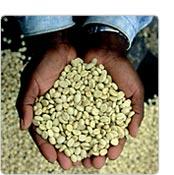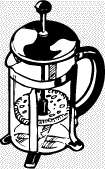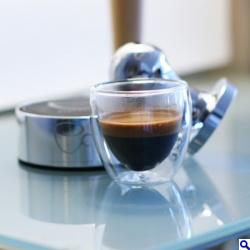กาแฟ..
ผมจำได้ว่า ตอนเด็กๆ ผมถูกสอนว่า ชา กาแฟ เป็นสารเสพติด ทำให้ผมไม่กล้ากินกาแฟอยู่นาน เพราะตอนเด็กๆทุกคนจะบอกว่า เด็กๆอย่ากินเลยกาแฟ มันไม่ดี
แต่ที่บ้านผม ทานกาแฟกับขนมปังเป็นอาหารเช้ากันทุกวัน ทำให้ผมได้ทดลองดื่มกาแฟในที่สุด จำได้ว่าวันที่แม่ให้ดื่มกาแฟได้ คิดว่าตัวเองเป็นผู้ใหญ่สุดๆแล้ว
แต่สมัยก่อนโลกของกาแฟสำหรับผม ก็ถูกจำกัดอยู่กาแฟผงสำเร็จรูป พวก เขาช่อง เนสกาแฟ ถ้าช่วงไหนได้กิน taster's choice นี่หรูสุดๆแล้วนะครับ กระปุกละสามสี่ร้อย กินไปแทบจะบินได้เลย นอกจากกาแฟสำเร็จรูปแล้วก็คงจะมีกาแฟรถเข็นปากซอย ที่เฮียแกชงกับถุงเท้า หรือไม่ก็กาแฟเย็นตามโรงอาหาร (แต่โลกกาแฟของคนอื่น อาจจะรวมถึง "คอฟฟี่ช๊อบ" ที่คุณ corgiman ชอบไปนั่งดูนักร้องอยู่บ่อยๆ)
แต่กินกาแฟไปยังไง ผมก็ไม่รู้สึกว่ามันจะเป็นสิ่งเสพติดตรงไหน กินแล้วหายง่วงบ้าง ไม่หายบ้าง บางทีกินปุ๊บหลับปั๊บก็เคย หยุดกินมันก็ไม่เห็นลงแดงสักหน่อย
แต่พอเริ่มมาเรียนหนังสือหนักเข้า ผมต้องพึ่งพากาแฟหนักเข้า หนักเข้า ผมถึงเข้าใจว่าอาการติดกาแฟ มันเป็นยังไง ถ้าถึงเวลาต้องกินแล้วไม่ได้กินมันจะรู้สึกมึนๆหัว ปวดหัวตึ๊บๆ ง่วงนอน ทำงานไม่ได้ แต่พอกินกาแฟเข้าไปสักแก้วอาการดังกล่าวก็หายเป็นปลิดทิ้ง พอติดหนักๆเข้า บางทียังอยากลองฉีดกาแฟเข้าเส้นเลย เผื่อมันจะหายง่วงเร็วขึ้น
ยังไง วันนี้ผมขอเล่าเรื่องกาแฟหน่อยละกันครับ
ว่ากันว่า กาแฟ เป็นเครื่องดื่มที่เป็นที่นิยม และดื่มกันแพร่หลายที่สุดรองจากน้ำเปล่าเลยทีเดียว ตำนานเล่าว่ามีการค้นพบว่ากาแฟมีสรรพคุณสร้างความกระฉับกระเฉงตั้งแต่สมัยคริสตศตวรรษที่เก้านู้น เมื่อคนเลี้ยงแพะคนนึงในทวีปแอฟริกา ไปเห็นแพะกินผลอะไรสักอย่างแล้วเกิดอาการคึกคักผิดปกติ ก็เลยกินเจ้าผลนี้ดูบ้าง และรู้สึกกระฉับกระเฉงมีเรี่ยวมีแรง ก็เลยเอาไปบอกคนอื่น เจ้าต้นไม้เพิ่มพลังก็เลยเป็นที่นิยมกันไปทั่ว ทั้งกินผลสด และชงน้ำกิน และการดื่มกาแฟก็ค่อยๆพัฒนาไปถึงการชงน้ำจากเมล็ดคั่ว
 กาแฟเป็นที่นิยมโดยเฉพาะกับนักบวชสมัยก่อน เพราะกินแล้วมีแรงสวดมนต์ได้นานๆ ช่วงที่กาแฟเข้าสู่ทวีปยุโรป ความขัดแย้งทางศาสนามีค่อนข้างสูง ชาวคริสเตียนทั่วไปจึงเชื่อว่า กาแฟซึ่งเป็นที่นิยมของชาวมุสลิมในประเทศอาหรับ เป็นเสมือน the drink of devil เพราะซาตานคงจะนำเครื่องดื่มนี้มาให้เพิ่มพลังให้ชาวมุสลิม เพื่อสู้กับไวน์ซึ่งเป็นเสมือนเครื่องดื่มของพระเจ้า กาแฟจึงเป็นเครื่องหมายของพวกต่อต้านคริสต์ไป
กาแฟเป็นที่นิยมโดยเฉพาะกับนักบวชสมัยก่อน เพราะกินแล้วมีแรงสวดมนต์ได้นานๆ ช่วงที่กาแฟเข้าสู่ทวีปยุโรป ความขัดแย้งทางศาสนามีค่อนข้างสูง ชาวคริสเตียนทั่วไปจึงเชื่อว่า กาแฟซึ่งเป็นที่นิยมของชาวมุสลิมในประเทศอาหรับ เป็นเสมือน the drink of devil เพราะซาตานคงจะนำเครื่องดื่มนี้มาให้เพิ่มพลังให้ชาวมุสลิม เพื่อสู้กับไวน์ซึ่งเป็นเสมือนเครื่องดื่มของพระเจ้า กาแฟจึงเป็นเครื่องหมายของพวกต่อต้านคริสต์ไปจนถึงคริสตศตวรรษที่ 15 Pope Clement VIII ออกมาแก้ปัญหาโดยการออกมาทดลองดื่มกาแฟ (คงอยากรู้ว่ากาแฟรสชาติเป็นไงกันแน่) พอได้ดื่มเข้าไปเท่านั้น ด้วยกลิ่นที่หอมหวล และรสชาติที่เข้มข้นของกาแฟ pope ก็เลย baptize กาแฟ และรับกาแฟเข้ามาเป็นเครื่องดื่มของชาวคริสต์ตั้งแต่นั้นมา มีคนบอกว่า ถ้าลองโป๊บห้ามคนดื่มกาแฟสิ นั่นจะเป็นบาปที่หนักกว่านะนั่น
หลังจากนั้น กาแฟ ก็เป็นที่นิยมอย่างแพร่หลายไปทั่วโลก และกลายเป็นเครื่องดื่มที่เป็นที่นิยมในแทบทุกประเทศ วิธีการชงกาแฟก็พัฒนาไปพร้อมๆกัน ปัจจุบันนี้เรามีทางเลือกดื่มกาแฟอยู่หลายวิธีครับ ไม่อยากจะบอกเลยว่าที่บ้านผม มีเครื่องทำกาแฟอยู่แทบทุกแบบเลย
ที่เห็นกันบ่อยๆก็คือกาแฟจากเครื่องชงแบบ drip ครับ เวลาชงน้ำร้อนจะหยดผ่านกาแฟบดละเอียด โดยใช้ฟิลเตอร์กระดาษกั้นเอาไว้ วิธีนี้ชงได้ปริมาณเยอะๆ ง่ายดี คนยุโรปจะเรียกกาแฟแบบนี้ว่ากาแฟแบบอเมริกา เพราะคนอเมริกากินกาแฟกันทีเยอะๆเป็นกระติก ต่างจากคนยุโรป ที่นิยมกินกาแฟเข้มๆแก้วเล็กๆ
 นอกจากนั้นก็มี กาแฟชงโดยใช้เครื่องชงแบบ french press ครับ วิธีทำก็คือเอากาแฟบด แช่น้ำร้อนสักสามนาที แล้วกดมุ้งลวดลงไป วิธีนี้ไม่ต้องใช้ฟิลเตอร์กระดาษ แต่ต้องล้างเยอะหน่อย กาแฟที่ได้มีกลิ่นหอม รสชาติเข้มข้น จะสังเกตได้ว่า เวลาที่ร้านจะให้ลองชิมกาแฟ จะใช้เครื่องชงแบบนี้ครับ เพราะได้รสของกาแฟเต็มที่
นอกจากนั้นก็มี กาแฟชงโดยใช้เครื่องชงแบบ french press ครับ วิธีทำก็คือเอากาแฟบด แช่น้ำร้อนสักสามนาที แล้วกดมุ้งลวดลงไป วิธีนี้ไม่ต้องใช้ฟิลเตอร์กระดาษ แต่ต้องล้างเยอะหน่อย กาแฟที่ได้มีกลิ่นหอม รสชาติเข้มข้น จะสังเกตได้ว่า เวลาที่ร้านจะให้ลองชิมกาแฟ จะใช้เครื่องชงแบบนี้ครับ เพราะได้รสของกาแฟเต็มที่ แต่พอกินกาแฟธรรมดานานๆ ผมว่ามันไม่ค่อยเข้มเท่าไร กินทีต้องกินเยอะๆ แล้วผมก็มารู้จักกับ espresso ตอนไปเรียนชงกาแฟแถวๆท่าพระอาทิตย์
 espresso นี่ก็คือ กาแฟที่ชงโดยใช้น้ำร้อนอัดความดันวิ่งผ่านเมล็ดกาแฟป่นละเอียด โดยใช้เวลาน้อยๆ กาแฟที่ได้จะมีรสชาติเข้มข้น กลิ่นหอมละมุน และ espresso ที่ดีจะมีครีมฟอง (crema) ลอยอยู่ด้านบน เจ้าครีมนี่แหละ เป็นตัวบอกอันดับแรกว่า espresso ดีหรือเปล่า (ประมาณเดียวกับ นักชิมไวน์ต้องมองดูสีของไวน์เป็นอันดับแรก)
espresso นี่ก็คือ กาแฟที่ชงโดยใช้น้ำร้อนอัดความดันวิ่งผ่านเมล็ดกาแฟป่นละเอียด โดยใช้เวลาน้อยๆ กาแฟที่ได้จะมีรสชาติเข้มข้น กลิ่นหอมละมุน และ espresso ที่ดีจะมีครีมฟอง (crema) ลอยอยู่ด้านบน เจ้าครีมนี่แหละ เป็นตัวบอกอันดับแรกว่า espresso ดีหรือเปล่า (ประมาณเดียวกับ นักชิมไวน์ต้องมองดูสีของไวน์เป็นอันดับแรก)espresso เป็นกาแฟที่เข้มข้นมาก กินทีนึงเป็น shot หนึ่ง shot ก็แค่ประมาณ 1.5-2 Oz เรียกว่าถ้ากิน double shot ก็ตาสว่างไปได้นานพอควรแล้วครับ ถ้าใครได้ลอง espresso จะรู้ว่ามันไม่ได้ขมอย่างเดียวนะครับ แต่มีความหวานและความมันรวมอยู่ด้วย เรียกว่า กินเปล่าๆไม่ใส่น้ำตาลยังได้
นักปราชญ์ชาวตุรกี ถึงกับกล่าวไว้ว่า Coffee should be black as hell, strong as death, and as sweet as love
 เครื่องทำ espresso แบบแรกที่อยากแนะนำให้รู้จักคือ moka pot ครับ บางทีก็เรียกว่า Italian Espresso Maker เครื่องชงแบบนี้ราคาถูก ใช้งานง่าย และสะดวก การทำงานของเครื่องชงแบบนี้ก็คือใส่น้ำลงไปในส่วนล่างของเครื่องทำกาแฟ ใส่กาแฟบดละเอียดไว้ตรงกลาง แล้วหมุนปิดทั้งสามส่วนไว้ เอาไปตั้งเตา พอน้ำที่อยู่ในกระเปาะส่วนล่างเดือด แรงดันไอน้ำจะดันน้ำร้อนพุ่งผ่านกาแฟบด ขึ้นไปกองเป็นกาแฟรสชาติเข้มข้นอยู่ข้างบน
เครื่องทำ espresso แบบแรกที่อยากแนะนำให้รู้จักคือ moka pot ครับ บางทีก็เรียกว่า Italian Espresso Maker เครื่องชงแบบนี้ราคาถูก ใช้งานง่าย และสะดวก การทำงานของเครื่องชงแบบนี้ก็คือใส่น้ำลงไปในส่วนล่างของเครื่องทำกาแฟ ใส่กาแฟบดละเอียดไว้ตรงกลาง แล้วหมุนปิดทั้งสามส่วนไว้ เอาไปตั้งเตา พอน้ำที่อยู่ในกระเปาะส่วนล่างเดือด แรงดันไอน้ำจะดันน้ำร้อนพุ่งผ่านกาแฟบด ขึ้นไปกองเป็นกาแฟรสชาติเข้มข้นอยู่ข้างบน  แล้วก็มาถึงเครื่องทำ espresso แบบใช้ไฟฟ้าครับ เครื่องแบบนี้จะอัดน้ำร้อนด้วยความดันสูงผ่านกาแฟบด และเครื่องแบบนี้ มีอีกสองแบบครับ คือ แบบ pump-driven กับ แบบ steam เครื่องแบบ pump-driven จะอัดน้ำร้อนด้วยปั๊ม ทำให้น้ำมีแรงดันสูงกว่า และอุณหภูมิน้ำไม่สูงเกินไป จึงเหมาะกับการทำ espresso มากกว่า(ถ้าใครจะซื้อไปใช้เองที่บ้าน อย่าลืมเลือกแบบ pump นะครับ) ส่วนเจ้าท่อข้างๆเครื่องนั้น เป็นท่อไอน้ำเอาไว้อุ่นและตีฟองนม สิ่งสำคัญของ espresso drink ส่วนใหญ่
แล้วก็มาถึงเครื่องทำ espresso แบบใช้ไฟฟ้าครับ เครื่องแบบนี้จะอัดน้ำร้อนด้วยความดันสูงผ่านกาแฟบด และเครื่องแบบนี้ มีอีกสองแบบครับ คือ แบบ pump-driven กับ แบบ steam เครื่องแบบ pump-driven จะอัดน้ำร้อนด้วยปั๊ม ทำให้น้ำมีแรงดันสูงกว่า และอุณหภูมิน้ำไม่สูงเกินไป จึงเหมาะกับการทำ espresso มากกว่า(ถ้าใครจะซื้อไปใช้เองที่บ้าน อย่าลืมเลือกแบบ pump นะครับ) ส่วนเจ้าท่อข้างๆเครื่องนั้น เป็นท่อไอน้ำเอาไว้อุ่นและตีฟองนม สิ่งสำคัญของ espresso drink ส่วนใหญ่ จริงๆแล้ว วิธีทำ espresso มีขั้นตอนค่อนข้างมาก (ไว้คราวหลังผมจะมาเล่าวิธีทำ espresso และการตีฟองนม แบบละเอียดกว่านี้ครับ เริ่มเหนื่อยแล้ว) แต่คร่าวๆคือ เริ่มจากการบดเมล็ดกาแฟให้ละเอียดมากๆ แล้วอัดกาแฟบดลงในฟิลเตอร์ แล้วก็เปิดเครื่อง ฟังเหมือนง่ายนะครับ แต่เป็นงานที่ต้องใช้ฝีมือพอควร โดยเฉพาะการอัด (tamper) กาแฟ ต้องมีเทคนิคเสียด้วย แต่ปัจจุบันเครื่องทำกาแฟพัฒนาไปมากครับ ถ้าใครไป starbucks เดี๋ยวนี้จะสังเกตว่า คนทำกาแฟไม่ต้องอัดกาแฟเองแล้ว เราจะไม่ได้ยินเสียงเคาะกาแฟทิ้งดังโป้งๆ แบบเมื่อก่อน เพราะเครื่องทำกาแฟรวมการทำงานทั้งการบด การอัด และการทิ้งกาแฟใช้แล้วอยู่ในเครื่องเดียวกัน เรียกว่ากดปุ่มเดียวก็ได้ espresso อร่อยๆมาทานแล้ว และรสชาติก็จะคงที่กว่าใช้คนอัด (แต่ไม่ได้แปลว่าอร่อยกว่านะครับ)เครื่องยิ่งดี อัดความดันได้สูง และรวมการทำงานหลายๆอย่างไว้ในเครื่องเดียว มีหัวทำกาแฟหลายหัว ยิ่งแพงครับ อาจถึงหลายๆหมื่นหรือถึงแสนได้ง่ายๆครับ
จริงๆแล้ว วิธีทำ espresso มีขั้นตอนค่อนข้างมาก (ไว้คราวหลังผมจะมาเล่าวิธีทำ espresso และการตีฟองนม แบบละเอียดกว่านี้ครับ เริ่มเหนื่อยแล้ว) แต่คร่าวๆคือ เริ่มจากการบดเมล็ดกาแฟให้ละเอียดมากๆ แล้วอัดกาแฟบดลงในฟิลเตอร์ แล้วก็เปิดเครื่อง ฟังเหมือนง่ายนะครับ แต่เป็นงานที่ต้องใช้ฝีมือพอควร โดยเฉพาะการอัด (tamper) กาแฟ ต้องมีเทคนิคเสียด้วย แต่ปัจจุบันเครื่องทำกาแฟพัฒนาไปมากครับ ถ้าใครไป starbucks เดี๋ยวนี้จะสังเกตว่า คนทำกาแฟไม่ต้องอัดกาแฟเองแล้ว เราจะไม่ได้ยินเสียงเคาะกาแฟทิ้งดังโป้งๆ แบบเมื่อก่อน เพราะเครื่องทำกาแฟรวมการทำงานทั้งการบด การอัด และการทิ้งกาแฟใช้แล้วอยู่ในเครื่องเดียวกัน เรียกว่ากดปุ่มเดียวก็ได้ espresso อร่อยๆมาทานแล้ว และรสชาติก็จะคงที่กว่าใช้คนอัด (แต่ไม่ได้แปลว่าอร่อยกว่านะครับ)เครื่องยิ่งดี อัดความดันได้สูง และรวมการทำงานหลายๆอย่างไว้ในเครื่องเดียว มีหัวทำกาแฟหลายหัว ยิ่งแพงครับ อาจถึงหลายๆหมื่นหรือถึงแสนได้ง่ายๆครับ ถ้าพูดถึง espresso แต่ไม่พูดถึง espresso drink อื่น ก็คงจะไม่ได้ ลองดูครับ เผื่อใครไม่คุ้น อ่านแล้วจะได้ลองสั่งกาแฟแบบอื่นมาทานบ้าง
- macchiato คือ espresso ใส่เฉพาะฟองนม ทำให้ลดความเข้มข้นของ espresso ลงมาหน่อย
- cappuccino คือ espresso ใส่นมร้อน และฟองนมเท่าๆกันครับ เครื่องดื่มยอดนิยม
- latte คือ espresso ใส่นมเยอะหน่อย ฟองนมน้อยหน่อยครับ
- mocha คือ espress ใส่นมและน้ำเชื่อมชอคโกแลต
- espresso con panna คือ espresso ใส่ whipped cream ครับ ขาวข้นหวานมัน
- ristretto คือ espresso แบบเข้มข้นพิเศษครับ เพราะใช้น้ำน้อยกว่าอีกครับ เข้มสุดๆ
- lungo คือ espresso ที่เจือจางหน่อยนึง คือปล่อยให้น้ำร้อนไหลผ่านนานกว่า espresso ปกติ
- americano คือ espresso เจือจางด้วยน้ำร้อนครับ เป็นการล้อเลียนคนอเมริกาหน่อยๆ สำหรับคนที่ชอบกาแฟแบบบางๆ
- affogato คือ espresso เสริฟกับไอติมครับ
นอกจากเครื่องชงกาแฟเหล่านี้แล้วก็ยังมีเครื่องชงแปลกๆอีกหลายประเภท เช่น กาแฟเวียดนาม ที่ใส่กาแฟไว้ด้านบนแล้วรอให้กาแฟค่อยๆหยดผ่านฟิลเตอร์ลงมาแก้วด้านล่าง กาแฟตุรกี ที่การทำงานคล้ายๆกับเครื่องทำ espresso แบบอิตาเลี่ยน ฯลฯ
อูย ยิ่งเล่า อาการติดกาแฟเริ่มออกฤทธิ์อีกแล้วครับ ขอไปกินกาแฟสักแก้วก่อนเหอะครับ

10 Comments:
kickoman เข้าใจผิดนะครับ
ผมน่ะ คอกาแฟสด เลยนะ ไอ้ประเภทไปนั่งเฝ้านักร้องนั่น ต้องโน่นเลย เสือจากดินแดน downunder โจรสลัดหมวกฟาง
ยิ่งแก่ยิ่งชอบกาแฟขมๆ ชอบที่ aftertaste ของกาแฟ มันไม่ต่างกันเท่าไหร่กับเวลาดื่มไวน์
ผมก็เป็นเเบบ Kickoman ครับมาติดกาแฟ ก็ตอนมาเรียนที่อเมริกานี่เอง ยิ่งกินยิ่งติดครับ คอกาเเฟทั้งหลายว่างๆ ลองหากาแฟเวียดนามดื่มดูนะครับ ผมว่าอร่อยมากเลย เข้มข้นถึงใจ นอกจากนั้นเค้ายังใส่นมข้นด้วยครับ ได้บรรยากาศกาเเฟ อาเเปะ อาเจ๊ก ที่ขายตามรถเข็นบ้านเราด้วย นี่ก็ว่าจะชวน kickoman ไปกินกาเเฟเเกล้มด้วยเฝอกันซักหน่อย
ติดกาแฟเหมือนกัน
วันไหนไม่ได้กินจะปวดหัว มึนไปทั้งวันทีเดียว
ได้อ่าน NG เล่มที่เกี่ยวกับ Caffeine
จำได้(คลับคล้ายคลับคลา)ว่ามีคนทำการทดลอง
เอาเครื่องไป scan สมองคนที่เข้าขั้น "ติดกาแฟ" พบว่า
หลังจากตื่นนอน ปริมาณเลือดที่ไหลเวียนในสมอง
น้อยกว่าคนธรรมดาทั่วไปอยู่หลายสิบเปอร์เซ็น
แต่หลังจากกาแฟถ้วยแรกผ่านไป
ปริมาณเลือดก็กลับมาเท่ากับคนธรรมดาทั่วไปอีกครั้งหนึ่ง
อ้อ .. จำได้อีกอย่างนึงว่า
มี professor คนนึงที harvard (มั้ง)
ไม่ชอบรสขมๆของกาแฟ .. เลยทำน้ำหวานผสม caffeine กินเองมันซะเลย
ฟังแล้วก็ทำให้นึกว่า... เอ้อ
บ้านเราน่ะมีกระทิงแดงนานแล้วเว้ยย
อ้อ .. วันก่อนคุยกับเพื่อนชาวเอธิโอเปีย
ผมบอกเค้าว่า ผมชักกังวลเพราะเดี๋ยวนี้ แต่ละวันกินกาแฟไม่ต่ำกว่า 2 แก้ว วันไหนหนักหน่อยก็สามแก้ว แม้แต่สี่แก้วยังมีเลย
เค้าหัวเราะแล้วตอบกลับมาว่า
"You know what, coffee is the major product of my country. We drink coffee all the time like German people drink beer.
If you are afraid of drinking too much coffee, you should see people on the street of my country. They drink 5-6 cups a day. I, myself, usually take 4"
ปล. ขยันเขียนจริงๆเลยว่ะ
อืม คนเอธิโอเปียนี่บ้ากาแฟจริงๆแหละ เจ้าของร้านกาแฟเจ้าประจำข้างที่ทำงานผมก็คนเอธิโอเปีย แต่ใช้เมล็ดกาแฟอิตาลีแหะ...
อ่านแล้วต้องไปชงกาแฟ
ที่เมืองไทยผมมีเครื่องชงเอสเปรซโซไว้
นั่นคือช่วงที่มีความสุขที่สุดในชีวิตของการกินกาแฟ
แต่ผมชอบบดกาแฟเอง อัดกาแฟเอง เหมือนพวกช่างละเลียดน่ะครับ ผมอยากเห็นทุกขั้นตอนของเม็ดกาแฟดำๆ จนกระทั่งกลายเป็นน้ำกาแฟ
มาอยู่ฝรั่งเศส ดินแดนคอกาแฟ ดีที่สุดที่หาได้ คือเครื่องชงแบบดริป แต่คนฝรั่งเศสนี่บ้ากาแฟจริงๆ
คือในซูปเปอร์เนี่ย แถววางของแถวหนึ่ง (Rayon) หรือแถวๆหนึ่งในซูปเปอร์ มีไว้ขายกาแฟโดยเฉพาะ ในขณะที่บ้านเราอย่างดีก็ชั้นๆหนึ่งในแถวที่ขายเครื่องดื่มชงๆ
ที่แปลกคือคนฝรั่งเศสไม่กินคอฟฟี่เมท
ส่วนตัวแล้วชอบกลิ่นแบบกาแฟเอธิโอเปีย ในวันเบาๆ เอ้ย วันที่ไม่ได้คิดอะไร เช่นกินก่อนไปเรียน ตอนบ่าย
แต่ถ้าตอนกลางคืน ต้องซานโตส บราซิล ผมว่ากลิ่นมันเร้าใจกว่า และ รสขมกระแทกๆ พอดี ผมว่าเอธิโอเปียมันออกหอมหวาน
กาแฟไทยที่ผมว่าดีที่สุด คือกาแฟดอยตุงครับ หาซื้อไม่ง่ายนัก กลิ่นหอมหวาน จะมีดอยตุงพรีเมียม เม็ดจะเล็กๆกลมๆหน่อย โอ้ย สุดยอดแล้วครับ ผมว่าถ้าเอาไปแนะนำในระดับโลก ผมว่าสามารถขึ้นชั้นกาแฟชั้นนำได้สบาย แต่ผมเข้าใจว่าปริมาณการปลูกอาจจะทำเช่นนั้นไม่ได้ เพราะคงไม่พอป้อนตลาดระดับใหญ่ขนาดนั้น
ว่าแล้วก็อยากกิน
เป็นคนไม่กินกาแฟ
แต่มาแนะนำหนังสือเล่มหนึ่งครับ
Coffee: A dark history โดย Antony Wild
ไม่เคยอ่าน แต่ไปพลิกดูมาแล้ว น่าสนใจดี kickoman ไปซื้อมาอ่าน แล้วเขียนเล่าให้ฟังด้วยเน้อ
ปล ถ้าจะซื้อหนังสือใดๆ ของ b&n online ติดต่อหลังไมค์ มาเอาเบอร์สมาชิกผมไปใช้ได้นะครับ
อืม น่าสนใจจริงๆครับ ผมเจอ review หนังสือเล่มนี้ใน washington post เลยเอามาฝากกันดู เดี๋ยวว่างๆจะไปซื้อมาอ่านดูดีกว่า
COFFEE A Dark History
By Antony Wild
Norton. 323 pp. $25.95
Antony Wild isn't kidding. The history of coffee is indeed as "dark," as his subtitle puts it, as the cup of Colombian that sits on my desk as these words are written. Himself a coffee lover and an expert on the subject -- he worked for more than a decade as the buyer for a prestigious British specialty-coffee company -- Wild is nonetheless no sentimentalist when it comes to the human and natural toll the bean has extracted -- "poverty, violence, exploitation, environmental devastation, political oppression, and corruption" -- nor to the threats that caffeine poses to the health of those who consume it. As he writes, with the wry touch that makes his book a pleasure:
"Nature has so ordered things that the highest levels of caffeine are to be found in the most important part of its plant, its seed. This is because caffeine is nothing more than a natural insecticide, and the high caffeine levels protect the seed from unwanted attention. Hapless insects who ingest too much find that their nervous systems go into overdrive. By the miracle of international trade, the same symptoms can be observed in office workers the world over."
However harmful caffeine may be -- a question on which the jury is still out, though Wild argues that "science produced by the coffee industry" glosses over and/or distorts its effects -- the buzz it produces has had a significant influence on human history. So Wild argues, and his case is persuasive. He is unable to trace coffee's beginnings to a precise point -- it is commonly understood to have originated in Ethiopia, and "it would appear that the Sufis were the first to adopt coffee drinking," in Yemen in the late 15th century -- but once he reaches the 16th century and the rise of coffeehouses in the Ottoman Empire, things start to fall into place.
The role of the coffeehouse, he argues, simply cannot be underestimated. In the Arab world it "was, other than the reviled tavern, the only place to meet friends outside the home, discuss politics and literature, play backgammon or chess and perhaps gamble," and thus it became "an integral part of the imperial system, providing a forum for the coming together and dissemination of news and ideas." When coffee arrived in Europe in the next century, the same development occurred. People who "had been accustomed to swilling considerable quantities of weak beer throughout the day," and were thus inclined to be phlegmatic and woozy, now were energized by caffeine, setting off "a revolution in . . . political, economic, and cultural life." Wild writes:
"It is almost impossible to distinguish the cultural effects of the coffee house from the physical effects of the coffee served in it. The environment of the 'Penny University' undoubtedly encouraged a degree of association between men who might otherwise never have met, but would they have formed societies without the intellectually stimulating nature of the beverage? It has been argued that, until the arrival of coffee, the population of Europe had existed in a constant state of mild intoxication, since the quality of water was such that many people drank the weak beers of the time morning, noon, and night. By switching to coffee, they were not only reducing the muddle-headedness resulting from alcohol consumption, but also ingesting a powerful new drug. Indeed, it could be said that the introduction of coffee to England led to a . . . 'brain explosion.' "
The list of British institutions that had their origins in coffeehouses is indeed impressive. It includes Lloyds of London, the Stock Exchange, the East India Company and the Royal Society, "which was to become the most illustrious scientific institution of the age." This was "the key contribution of coffee house culture to Britain," with remarkable ramifications: "That these societies consolidated into institutions that were no longer based in coffee houses reflects their evolutionary success and the adaptability of the coffee house culture, which could inspire the creation of august commercial institutions . . . , a magazine such as the Spectator , the first use of the ballot box, the Royal Society, Freemasonry, and the police force."
This creature whom Wild calls "Coffee House Man: energetic, self-motivated, political, practical, reformist, well-connected, cultured, and philanthropic," changed much more than England. Revolutions in the American colonies and then in France traced much of their origins to coffeehouse palavering; indeed, wherever coffee was and is drunk its influence has been nothing short of spectacular. Caffeine -- whether in coffee or tea or in the "so-called 'energy' [soft] drinks which were heavily caffeinated" -- is the fuel that drives the world, as one need look no farther than the nearest coffee line at an office cafeteria to see.
Like so much else in human life, in other words, coffee giveth and coffee taketh away. Its sensory pleasures are undeniable (though not easily found in a world where most coffee is mediocre or worse), and its energizing powers are formidable. So, too, is its place in the international economy. The World Bank "estimates that a staggering 500 million people globally are involved directly or indirectly in the coffee trade," only a tiny number of whom are getting wealthy in the process. Mostly coffee is grown, harvested and processed by subsistence laborers and farmers, producing coffee "at the lowest possible cost for markets in the developed world." Wild, who views this "colonialism" with what can only be called anger, minces few words:
"Instead of living by the old maxim that 'Trade follows the flag,' powerful corporations have realized that it is easier to dispense with the burdensome responsibilities of actual colonization, and use modern transnational organizations such as the [World Trade Organization], the World Bank and the [International Monetary Fund] to impose their will from the boardrooms of Manhattan, Paris, and Berlin. For the impoverished farmer whose national politics bend to the needs of these transnational institutions and the corporations they serve, the notion of democracy is a spurious validation of the yoke under which they are forced to work."
No matter where one looks, the coffee picture is not pretty. When it was introduced to the Western Hemisphere in the 18th century, the common feature in all the countries where it flourished -- Jamaica, Cuba, Guatemala, Peru, Costa Rica, Venezuela, Mexico -- was "that they had large existing slave populations that enabled coffee growing to be established with startling rapidity." The huge plantations of Brazil were "founded on the continuation of slavery long after it had been banned in Europe." In 1880, one member of Parliament said, "Brazil is coffee, and coffee is the negro." Eight years later, Brazil finally banned slavery, but the conditions under which the ostensibly freed laborers worked barely changed.
Coffee is now huge in Vietnam, "the second largest producer of coffee worldwide" after Brazil, which is -- at least for the moment -- good for Vietnam, but according to Wild its "massive increase [in production] has been blamed for the global collapse of coffee prices." There are also "unsubstantiated but persistent rumours concerning possible dioxin contamination of the coffee crop, a legacy of the widespread spraying of Agent Orange by the Americans during the Vietnam War. Vietnam is the country where coffee's dark history has come home to roost with a vengeance."
Et cetera. Like sugar (see Sidney Mintz's Sweetness and Power: The Place of Sugar in Modern History ), cotton and many other agricultural products that are grown to serve the global market, coffee has a long history of exploitation and abuse of resources both human and natural. The indignation with which Antony Wild tells its story is well founded, and so too is the sorrow: "Coffee used to be a business in which, despite its manifest drawbacks, a man could think himself honourably employed. In common with many other businessmen, the coffee man as often as not now finds himself effectively a receiver of stolen goods and an enslaver of the Third World. The more conscientious may scratch their heads and wonder how on earth this came about. Most keep their conscience prisoner."
[move]i love coffee [/move]
แวะเข้ามาอ่านเรื่องราวกาแฟค่ะ ชอบกาแฟมากๆ มาแอบเอาข้อมุลไปใส่ปล้อกด้วย ^_^
ขอบคุณสำหรับเรื่องราวดีๆค่ะ
ทุกวันนี้ ก็ยังไม่มั่นใจว่าทานกาแฟ มีประโยชน์ หรือ โทษมากกว่ากัน
ติดหนึบหนับเหมือนกันค่ะ
off white jordan 1
jordan retro
balenciaga
nike cortez
zx flux
moncler outlet
golden goose sneakers
cheap jordans
nike air max 2019
golden goose francy
Post a Comment
<< Home